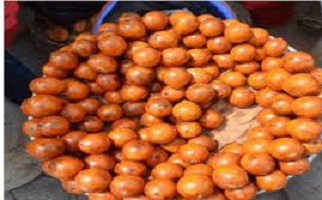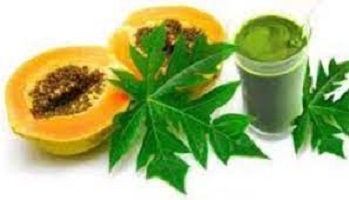Health Benefits of Udara/Agbalumo/African Star Apple
Health Benefits of Udara/Agbalumo/African Star Apple. Please Watch this Short Video for a detailed explanation
Botanically known as Chrysophyllum albidum, the udara/agbalumo fruit is mostly grown in rural areas and is in season from December to April.
Table of Contents
Udara/Agbalumo Fact

- Type: Fruit
- Plant: Perennial plant
- Season: December – April
- Varieties: Sweet and Sour
- Botanical Name: Chrysophyllum Albidum
- Native: Tropical countries like Nigeria and Uganda
An Overview of the Udara/Agbalumo/African Star Apple Fruit
In Nigeria, the African star apple, also known as the white star apple, “cherry,” agbalumo (Yoruba), udara (Igbo), agwaluma (Hausa), and otien (Edo), is associated with the dry season.
African star apple, botanically known as Chrysophyllum albidum (Family Sapotaceae), is a popular tropical fruit tree found throughout southern Nigeria.
Agbalumo is common in both urban and rural areas, especially from December to April.
The exotic fruit’s skin is chewable and edible, ranging in color from green to orange depending on the stage of ripeness.
I remember using the seeds for local games like Ayo or Suwe back in the day.
My friends and I also chewed the udara flesh and skin so hard that it turned to gum… sweet reminiscences of the past
Description
Udara/Agbalumo/African Star Apple have brown seeds covered in the creamy pulp that are usually eaten.
Unripe udara is sour, whereas ripe fruit is typically very sweet. The sweet fruits are typically not harvested from the trees, but rather allowed to fall naturally to the ground where they are picked. The fruit is found primarily in African countries such as Nigeria, Ghana, Côte d’Ivoire, Uganda, Cameroon, and Niger Republic.
Why does some agbalumo taste sour and have a slapping sensation?
In Nigeria, African Star Apple is a popular seasonal fruit that is usually eaten with its flesh. It is mostly grown in rural areas of the country and is currently in season.
Although it is best to let the fruit fall to the ground before harvesting, it is common practice for people to pluck it from the tree even if it has not fully ripened.
This is one of the primary causes of its sour flavor and slapping sensation when consumed.
But, when consumed fully ripen, agbalumo is sweet, and lush, and sensitizes the eater’s taste buds. To top it all off, it is extremely nutritious and provides the following advantages:
The Health Benefits of Udara/Agbalumo (African Star Apple)
- It is a healthy food because, like most fruits, it has low-calorie content due to its low-fat content.
- It is an excellent snack because its high fiber content provides food bulk, which both increases satiety and aids digestion, making it ideal for dieters.
- It contains a surprisingly high amount of Ascorbic Acid (Vitamin C). Clearly, Vitamin C sources are not limited to the citrus fruit family; in fact, Guava has far more!
- Recently published research in Nigeria on Udara/Agbalumo leaves on rats revealed two potential medicinal uses:
It could serve as a natural source of Anti-Oxidant booster to remove free radicals from oxidative stress disorders, and
Its leaf extract contains Hypoglycemic (to treat Diabetes) and Anti-Platelet activities
Nutrient Content per 100g edible Udara/Agbalumo pulp
- Nutrient Quantity
- Energy (Kcal) 91.09
- Carbohydrate (g) 10.49
- Protein (g) 6.99
- Fat (g) 2.49
- Moisture (g) 73
- Vitamin C (mg) 25
Economic uses and potentials of Udara/Agbalumo
The seeds could be used in local games. The fruit pulp is an excellent raw material source for industries.
Economic studies on the production of fruit juice from a locally sourced fruit African star apple revealed a production cost of 37.48/500ml Tetra Pak of Agbalumo juice stood at ₦137.48.
The fleshy and juicy fruit could be used to make soft drinks. The fruits are suitable for making fruit jams and jellies.
The findings of the study could be of commercial interest to pharmaceutical companies and research institutes in the development of new drugs.
Because we’re in the season for this lovely fruit, let’s try it for its numerous health benefits.
Preservation of Agbalumo (African Star Apple)
How to Store Agbalumo
- A lot of African star apples
- Brown sugar (you can substitute regular sugar)
- Sugar syrup (make some by boiling sugar in water until it thickens slightly). Take care not to overcook the syrup, as it will burn and become bitter).
Method
- Cut open the fruits and scoop out the flesh. Transfer the chopped/minced ingredients to a large jar. Then, add some sugar and/or sugar syrup to taste. There is no need for cooking or boiling.
- Cover the jar and store it in a cool, dry place, preferably in the refrigerator. It is also possible to freeze it. After a day or two of macerating, it is best to use.
- The flavor is divine…
People also ask
These questions and answers provide a comprehensive overview of the African star apple, covering aspects such as its characteristics, nutritional benefits, cultural significance, cultivation, and potential uses.
How is the African star apple harvested and stored?
The fruit is usually handpicked when fully ripe. It is essential to handle the fruit with care to avoid bruising, as it has a delicate skin. Once harvested, African star apples can be stored at room temperature for a few days. Refrigeration can prolong their shelf life.
Are there different varieties of the African star apple?
Yes, there are several varieties of Chrysophyllum albidum with slight variations in size, color, and taste. Local names and preferences may differ across regions.
Are there any environmental benefits associated with the African star apple tree?
The African star apple tree contributes to biodiversity and environmental sustainability. It helps prevent soil erosion, provides shade, and supports local ecosystems.
Are there ongoing research and development efforts related to the African star apple?
Yes, research is being conducted to explore the full potential of the African star apple, including its nutritional content, medicinal properties, and potential applications in the food and pharmaceutical industries.
How does climate change impact the cultivation of the African star apple?
Changes in temperature and weather patterns due to climate change can affect the growth and productivity of the African star apple. Sustainable agricultural practices are being promoted to mitigate these challenges.
Can the African star apple be used in processed food products?
Yes, the fruit can be processed into various products such as jams, jellies, and beverages. Its unique flavor and nutritional profile make it a versatile ingredient in the food industry.
How is the African star apple being promoted for commercial purposes?
Efforts are being made to promote the commercial cultivation and marketing of African star apples.
This includes educating farmers on best practices, developing value-added products, and exploring export opportunities.
Are there any cultural or traditional celebrations associated with the harvesting of African star apples?
In some West African communities, the peak season of African star apples is celebrated with festivals and cultural events. This may involve traditional dances, rituals, and communal gatherings.
Can the seeds of the African star apple be used for any purpose?
Some communities use the seeds for medicinal purposes, while others grind them into powder for culinary uses or even as livestock feed.
How is the African star apple contributing to food security in West Africa?
The fruit’s nutritional content and resilience to certain climate conditions make it a valuable asset for enhancing food security in West Africa.
Its cultivation provides a locally available and nutritious food source, especially during the dry season.
Can African star apple affect pregnancy?
While African star apple, also known as Agbalumo or Udara, is a nutritious fruit with health benefits, there is limited scientific evidence on its direct impact on pregnancy. In moderation, it is generally considered safe for pregnant women to consume.
However, it is advisable for pregnant women to consult their healthcare providers for personalized advice.
Does African star apple have any nutritional benefits for pregnant women?
Yes, African star apple is a good source of essential nutrients such as vitamin C, calcium, potassium, and antioxidants. These nutrients can contribute to the overall health and well-being of pregnant women. However, it’s important to consume it as part of a balanced diet.
Are there any potential risks associated with consuming African star apple during pregnancy?
Excessive consumption of any food during pregnancy may lead to potential risks. While African star apple is generally considered safe, pregnant women should avoid overeating to prevent any adverse effects. Additionally, those with allergies or sensitivities to certain fruits should exercise caution.
Can African star apple be consumed in any form during pregnancy?
African star apple can be consumed in its fresh form, and its nutritional benefits are best retained when eaten raw. However, pregnant women may also enjoy it in moderation as part of smoothies, salads, or other dishes. It is advisable to wash the fruit thoroughly before consumption.
Are there any cultural beliefs or practices related to African star apple during pregnancy?
In some cultures, African star apple is believed to have certain traditional or cultural significance during pregnancy. However, these beliefs may vary, and it’s essential for individuals to rely on scientific information and consult healthcare professionals for accurate advice.
Can African star apple induce labor or have any impact on the gestation period?
There is no scientific evidence to suggest that the African star apple can induce labor or have a direct impact on the gestation period. Pregnant women should rely on established medical practices and consult with their healthcare providers regarding any concerns related to labor or gestation.
Remember, individual responses to foods can vary, and it’s always best to consult with a healthcare professional for personalized advice during pregnancy.
What season does Agbalumo come out?
The fruit, botanically known as Chrysophyllum albidum, is mostly grown in rural areas and is very common between December and April.
What are the disadvantages of star apple?
Some people may be adversely affected by star fruit, owing to its high oxalate content. As a result, people with kidney problems should avoid star fruit and its juice – or consult a doctor first.
What are the benefits of eating Udara?
This fruit is high in antioxidants. In a living body, antioxidants remove potentially harmful oxidizing agents.
Because vitamin C is an antioxidant, udara is high in natural antioxidants. Antioxidants aid in the prevention of free radical damage to the body.
What is the English name for the Udara fruit?
The African star apple (or white star apple; botanical name Chrysophyllum albidum), also known locally as agbalumo or udara, is a West African exotic fruit with a tough leather-like skin that varies in color from green to dark orange depending on the stage of ripeness.
When is the season for star apples?
The star apple is in season in Costa Rica from late January to April.
You may have also heard it referred to as cainito, aguay, or milk fruit; in Costa Rica, it is known as caimito.
Is star apple healthy for the kidneys?
According to research, eating starfruit can be harmful (toxic) to people who have kidney disease.
Starfruit contains substances that can affect the brain and cause neurological disorders. This poisonous substance is known as a neurotoxin.
Is star apple beneficial to ulcers?
Among the different but complementary modes of action of the extracts, the favoring of mucosal protective mechanisms was observed.
Thus, the functional potential of C. cainito fruits in the prevention of gastric ulcer disease has been highlighted here.
What effect does Agbalumo have on the body?
Agbalumo has high vitamin C content, with 100g providing approximately 25mg of vitamin C.
This aids in the prevention of immune system deficiencies, cardiovascular disease, prenatal health issues, eye disease, and even skin wrinkling.
Is Agbalumo good for diabetics?
According to herbal medicine experts, the African cherry, also known locally as Agbalumo or Udara, has properties that can help prevent and manage diabetes and heart disease.
Is Agbalumo a vegetable or a fruit?
Agbalumo is a wonderful fruit that, when cut open, forms a star shape. This is why it is known as the star apple.
The rounded brown fruit can be very sweet, but some people avoid buying it because they are afraid of getting a sour one.
What are the benefits of Udala fruit?
Udara aids in weight loss. The fruit is high in fiber, which suppresses your appetite and keeps you from overeating.
The fruit lowers cholesterol and blood sugar levels, lowering your risk of heart disease. Udara aids digestion, reducing bloating and constipation.
Fruit tree Udara ~ Udara fruit tree
Udara fruit (Chrysophyllum albidum, also known as white star apple) is a forest fruit tree described by Scottish botanist George Don. It can be found all over tropical Africa.
What is the English name for the Udara fruit?
African star apple
The African star apple is known in Yoruba as agbalumo and in Igbo as Udara. It is also known as the African cherry. It’s tasty and low in calories.
What are the health benefits of Udara fruit? Udara Fruit Benefits
This fruit is high in antioxidants. In a living body, antioxidants remove potentially harmful oxidizing agents.
Because vitamin C is an antioxidant, udara is high in natural antioxidants. Antioxidants aid in the prevention of free radical damage to the body.
Udara leaf ~ what are the health benefits of Udara leaves?
Because vitamin C is an antioxidant, udara is high in natural antioxidants. Antioxidants aid in the prevention of free radical damage to the body.
Free radicals are unstable molecules that are produced in your cells during metabolism. In response to stress or injury, their production increases.
Udara seed ~ what is Agbalumo seed used for?
The seed is used to treat skin infections in some parts of Nigeria. It is widely used in folk medicine.
Agbalumo’s sweet and sour flavor acts as a natural remedy for common ailments such as constipation, toothache, sore throat, and indigestion.
Is Udara also known as cherry?
Cherry, botanically known as Chrysophyllum albidum, is a member of the Sapotaceae family.
It’s known as udara in Igbo, agbalumo in Yoruba, and otien in Edo.
While many people dislike the taste, others dislike the sticky nature of the fruit’s inner pulp.
What are the health benefits of African star apple in pregnancy?
According to nutritionists, it relieves constipation, and sore throat, and aids digestion, all of which are common problems for pregnant women.
“It contains more vitamin C than many other fruits, it is rich in calcium, iron potassium, phosphorous, magnesium, tannins, flavonoids, terpenoids, and phytochemicals.
Is African star apple good for men?
Recent research has shown that ethanolic extracts of African star apple or cherry can harm male fertility.
Chukwuma Muanya and Adaku Onyenucheya are the authors. According to new research, the ethanolic root bark extract of African cherry may harm male fertility.


